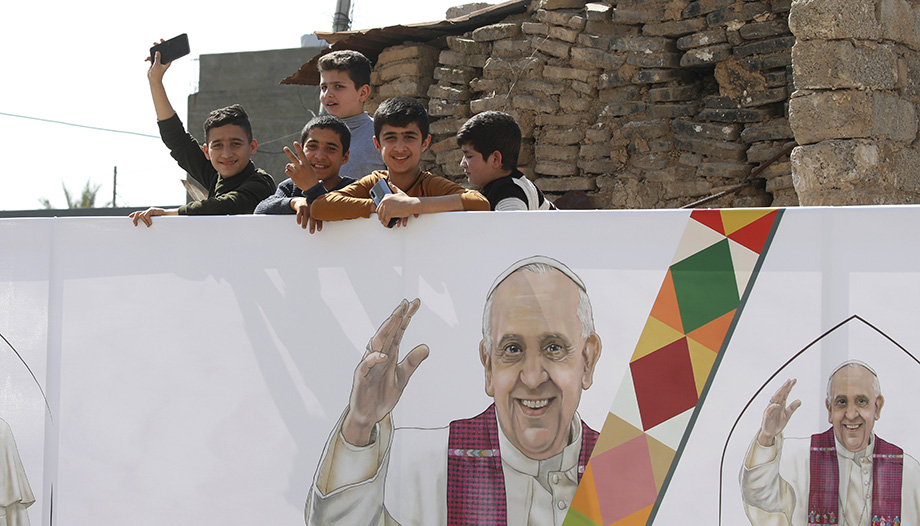Let me begin with an important premise, key to a good understanding of the extraordinary figure of Pope Francis: the Holy Father understands his ministry as a service to the unity and fraternity of mankind, with great awareness. If the successor of Peter is always a real and effective sign of communion for the Church, the current Pope has given this function of his a very lively missionary horizon, offering the seed of unity that is the Church to all people of every creed and nation.
Seen in this light, the ecumenical dimension of the apostolic journey to Iraq that Francis has just completed should come as no surprise. Leaving aside other very relevant values of the visit, such as the interreligious dialogue with Islam or the consolation brought to the Catholic communities surviving a crisis that has lasted for decades, the encounter with the Christian East has been one of the focal points of this historic moment.

The Pope does little theorizing when it comes to embracing Christians of other Churches and communities. He exercises rather an ecumenism that we could call 'pilgrim'. He sets out on a journey, and while walking he meets people, believers and non-believers, and recognizes in these coincidences a call to open up, to give of oneself and to unite. This is the perspective in which the entire visit took place, as the Holy Father himself explained to us on the esplanade of Ur of the Chaldeans, the home of the great patriarch Abraham, who has become a patron saint of the Church. de facto of this journey. There he recalled the call of God to leave his land, to set out on the road and to be the father of as many believers as there are stars in the firmament. There he offered us the pilgrimage of Abraham as the great symbol of the Church and of the history of mankind, of its common yearnings, of its harmony, of its difficulties.
In the Catholic cathedral of Baghdad, a holy land watered by the blood of so many martyrs, especially remembered in the latest atrocious persecution by ISIS, Pope Francis offered us a beautiful spiritual commentary on the communion of Christians through the metaphor of the tapestry, with a happy nod to the Persian culture with which he was celebrating: the Church, he said, is like a carpet, unique and beautiful, woven with so many threads and fabrics of different colors, as varied are the Christian communities present in the East, with a patrimony of spirituality, liturgy and pastoral forms that is a treasure for the Church throughout the world. The weaver, of course, is God, with his pattern of warps and wefts, his patience made of care and detail, his patches if they appear broken and untied.
As a practical exercise of this loom, there was a historical milestone: a pope celebrated for the first time in the Chaldean riteThe Church of Iraq is akin to that of the Iraqi Church. In fact, in the eighteenth and nineteenth centuries, some Christian communities of the Middle East joined the Roman Catholic Church, forming the Syro-Catholic and Chaldean Churches, still present, although much diminished today.
Another significant ecumenical moment has been the meeting between Pope Francis and Patriarch Mar Gewargis of the Assyrian Church of the East, a millenary Christianity, with apostolic origins, of Semitic spirituality, missionary in all the regions of the Silk Road, until reaching India and China, and also marked by the successive martyrdom of the Persians, Mongols and Turks. With this Church, separated from Rome for centuries, a progressive rapprochement has been taking place since the pontificate of John Paul II.
Mosul, Qaraqosh, Erbil... the places the Pope has visited first bring to mind, as spontaneously as they do tragically, images of battles, razed cities and casualty counts. That Francis has added to this terrible album the photos of joy, hugs and hopeful glances is no small gesture of charity. In the midst of this Lent, God has consoled his people. In the last act of the Apostolic Visit, the Mass celebrated in Erbil, the Holy Father described in his homily how Jesus Christ foretold, to the scandal of his contemporaries, the ruin of the temples, while promising their restoration by the hand of God. He thus announced his resurrection, and the great gift of a new Temple, which was himself, where we will all be reunited. Unity is also a path to Easter.
Professor of Theology at the University San Dámaso. Director of the Ecumenical Center of Madrid and Vice-consiliary of the Cursillos of Christianity Movement in Spain.








